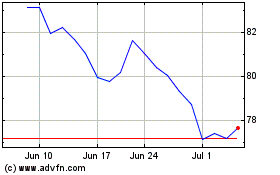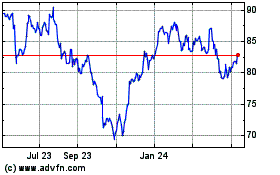World's Smallest Pacemaker, Medtronic Micra TPS, Featured in Late-Breaking Trial Session at EUROPACE 2015
June 22 2015 - 9:12AM


Global clinical
trial finds Medtronic Micra Transcatheter Pacemaker Meets Initial
Safety and Performance Measures
DUBLIN and MILAN - June 22,
2015 - Medtronic plc (NYSE: MDT) today reported study results
of its Micra® Transcatheter
Pacing System (TPS) at a late-breaking clinical trials session at
EHRA EUROPACE-CARDIOSTIM 2015 in Milan. The study results
demonstrated that the miniaturized pacemaker met initial safety and
performance measures in its global clinical trial.
Of the first 140 patients who received the Micra
TPS, 100 percent were successfully implanted. At one- and
three-month follow ups, all patients had mean electrical pacing
measurements within expected ranges.
"The initial results for this novel device are
quite promising, and similar to results seen with conventional
pacemakers," said Philippe Ritter, M.D., principal investigator of
the Micra TPS Global Clinical Trial and cardiologist at University
Hospital of Bordeaux. "Patients in this study have fared very well,
and if the strong safety and performance profile of the Micra TPS
continues with more patients and over the long-term, this
transcatheter pacing therapy will prove to be a simpler,
less-invasive pacemaker option while maintaining therapy
effectiveness."
The first 140 patients in the Medtronic Micra TPS
Global Clinical Trial were implanted by 37 physicians at 23 sites
across Asia-Pacific, Europe and the United States. They spanned a
wide variety of patient profiles such as age (from 21 to 94 years),
weight (ranging from 41 to 148 kilograms), and residence (including
Asia-Pacific, Europe and the U.S.). Patients considered to be at
high risk also participated in the study, including patients with
lung disease such as COPD (chronic obstructive pulmonary disease)
and pulmonary hypertension.
Of the 140 patients followed for an average of 1.9
months, eight patients experienced a serious adverse event and most
of these were easily managed; only two patients (1.4 percent)
experienced events which resulted in prolonged hospitalization.
This rate is in line with rates observed in studies of traditional
pacemakers.1 Importantly,
there were no infections or dislodgments, and no events required
surgical re-operation or resulted in death. Further, there were no
(0) unanticipated serious adverse device events (assumed <5
percent).
Testing of electrical performance at three months
showed the pacing threshold was lower (0.51V at 0.24ms) than the
pre-specified performance objective (<2.0V at 0.24ms), resulting
in an expected average longevity of at least 10 years.
These initial results from the clinical trial also
were published in the European Heart Journal,
Early performance of a miniaturized leadless
cardiac pacemaker: the Micra Transcatheter Pacing Study.2
At less than one-tenth the size of traditional
pacemakers, the Micra TPS provides the most advanced pacing
technology available while being cosmetically invisible and small
enough to be delivered with minimally invasive techniques through a
catheter, and implanted directly into the heart. The small size and
short length of the Micra device allows physicians to implant more
than one device within the heart, if needed.
Comparable in size to a large vitamin, the Micra
TPS does not require the use of wires, known as "leads," to deliver
pacing therapy; rather, it is attached to the heart via small tines
and delivers electrical impulses that pace the heart through an
electrode at the end of the device. Once positioned, the Micra TPS
can be repositioned or retrieved, if needed. The device responds to
patients' activity levels by automatically adjusting therapy. Micra
TPS also is the first transcatheter pacing system to be awarded CE
(Conformité Européenne) Mark for 1.5T and 3T full body MRI
scanning, providing patients with access to the most advanced
imaging diagnostic procedures.
Unlike traditional pacemakers, the Micra TPS does
not require a surgical "pocket" under the skin, so potential
sources of complications from this type of implantation are
eliminated-as are any visible signs of the device.
The Micra TPS was commercially launched in Europe
earlier this month after being awarded CE (Conformité Européenne)
Mark based on data from the Medtronic Micra TPS Global Clinical
Trial. The trial is ongoing and will continue to evaluate the
safety and efficacy of the device through a single-arm,
multi-center study that has enrolled more than 700 patients at 56
centers in 19 countries.
In the United States, the Micra TPS is an
investigational device and not yet approved for commercial
use.
In collaboration with leading clinicians,
researchers and scientists worldwide, Medtronic offers the broadest
range of innovative medical technology for the interventional and
surgical treatment of cardiovascular disease and cardiac
arrhythmias. The company strives to offer products and services
that deliver clinical and economic value to healthcare consumers
and providers around the world.
About Medtronic
Medtronic plc (www.medtronic.com), headquartered in Dublin,
Ireland, is the global leader in medical technology - alleviating
pain, restoring health and extending life for millions of people
around the world.
Any forward-looking
statements are subject to risks and uncertainties such as those
described in Medtronic's periodic reports on file with the
Securities and Exchange Commission. Actual results may differ
materially from anticipated results.
- end -
1 Udo et al. FOLLOWPACE. Heart Rhythm 2012;9:729
2 European Heart Journal,
doi:10.1093/eurheartj/ehv214
Contacts:
Kathleen Janasz
Public Relations
+1-763-526-3676
Jeff Warren
Investor Relations
+1-763-505-2696
This
announcement is distributed by NASDAQ OMX Corporate Solutions on
behalf of NASDAQ OMX Corporate Solutions clients.
The issuer of this announcement warrants that they are solely
responsible for the content, accuracy and originality of the
information contained therein.
Source: Medtronic plc via Globenewswire
HUG#1929975
Medtronic (NYSE:MDT)
Historical Stock Chart
From Mar 2024 to Apr 2024

Medtronic (NYSE:MDT)
Historical Stock Chart
From Apr 2023 to Apr 2024
